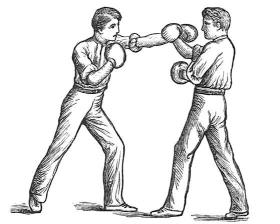Smart Irrational Behaviour
In the first, a stimulus is received and sent to the brain to be processed. Conscious thoughts are involved, and the various components of the mind work out a reaction. This takes an amount of time on the order of seconds, at least.
In the second, a stimulus is received and action is chosen by a highly optimized faculty of the brain. Reaction happens before conscious thought, and so this is, literally, an irrational action. This happens on the order of milliseconds.
A major component of training for physical self-defence is programming that preconscious faculty with knowledge about what to do when an attack is on its way, what to follow up with, and various other relevant things, like human biomechanics and weak spots. That way, reaction to an attack is immediate. Hesitation can be fatal.
All the data programmed into the preconscious faculty could be derived from rational thought: an elbow bends only this far in this direction, so if force is applied here the subject will respond by moving that way to alleviate the tension; or if enough force is applied the elbow will break. But working through this violence calculus consciously at the time when it’s needed would be far too slow, even if it did arrive at physically correct conclusions on the first try.
This shows that rational thought is not supreme, and that irrational behaviour can be effective, and therefore smart.
Similarly, a civilization that considered all moral questions individually, rationally, and as they were needed, would be slow, inefficient, and prone to errors. A more successful strategy would involve receiving wisdom from ancestors, from systems that have worked for generations.










